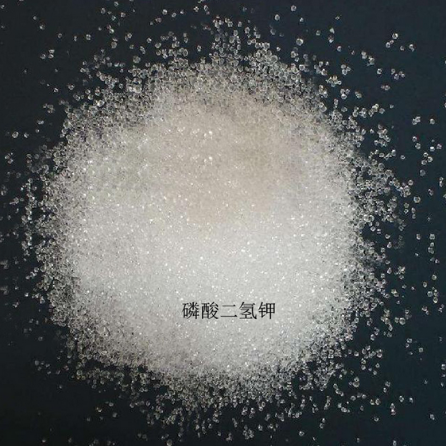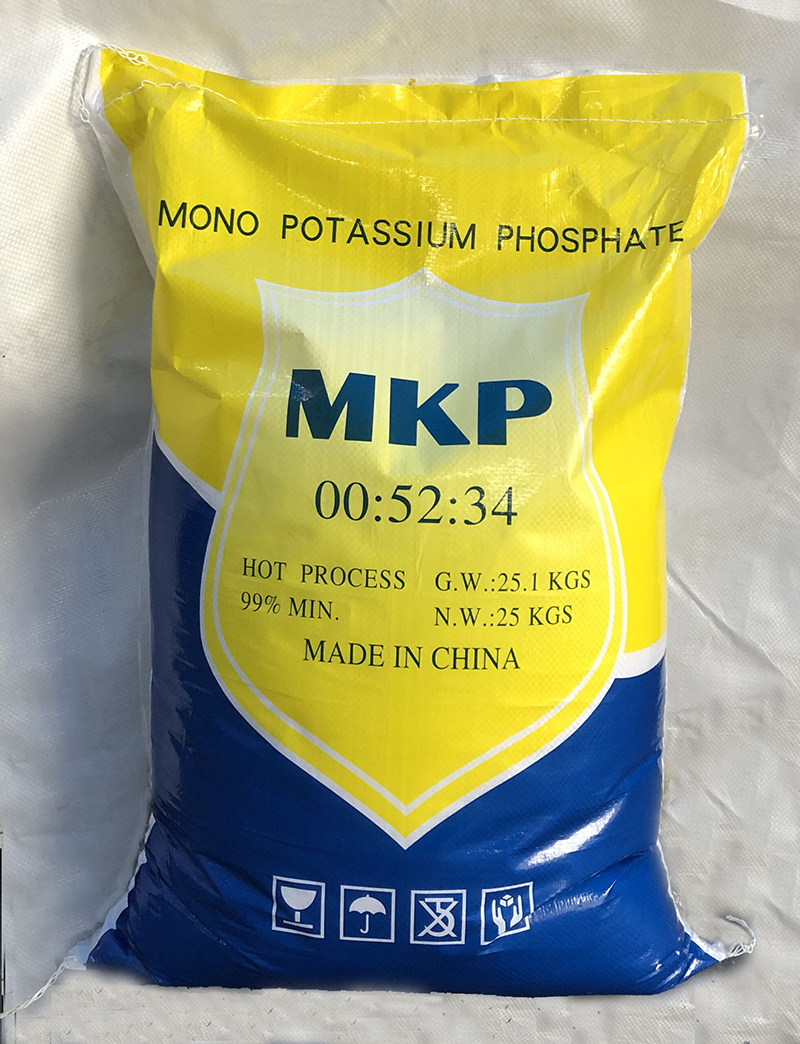Potassium Dihydrogen Phosphate(Chemical formula: KH2PO4)Sealed storage, stable in the air, lose water at 400 ℃, become metaphosphate, used to prepare buffer, determine arsenic, antimony, phosphorus, aluminum and iron, prepare phosphorus standard solution, prepare culture medium, determine inorganic content in serum Phosphorus and alkaline phosphatase activity.
【Basic information】
Chinese name | Potassium Dihydrogen Phosphate | English name | Potassium Phosphate Monobasic |
Exterior | Colorless crystal or white granular powder | Chemical formula | KH2PO4 |
Molecular weight | 136.09 | Water soluble | 22.6g/100ml water,Insoluble in ethanol |
CAS Registry Number | 7778-77-0 | EINECS Login ID | 231-913-4 |
Melting point | 252.6℃ | Flash point | Nonflammable |
Density | 2.338 g/cm3 | Store | Keep sealed |
~ Sexual description | S24/25A | Risk description | R36/38 |
Application | Preparation of buffer solution, determination of arsenic, antimony, phosphorus, aluminum and iron, preparation of phosphorus standard solution, preparation of culture medium | ||
Quality inspection information
Quality inspection item index value
Arsenic (As),% ≤ | 0.0002 |
Lead(Pb),% ≤ | 0.001 |
Clarity test/number ≤ | 2 |
pH(50g/L Solution,25℃) | 4.2~4.5 |
Content(KH2PO4),% | 99.5~100.5 |
Water insoluble matter,% ≤ | 0.002 |
Heavy metal(As Pb),% ≤ | 0.001 |
Sodium(Na),% ≤ | 0.02 |
Iron(Fe),% ≤ | 0.001 |
Copper(Cu),% ≤ | 0.0003 |
Loss on drying,% ≤ | 0.2 |
Total nitrogen(N),% ≤ | 0.001 |
Chloride(Cl),% ≤ | 0.0005 |
Sulfate(SO4),% ≤ | 0.003 |
Physical and chemical properties
Appearance: white powder, easy to deliquesce when placed in the air
PH: pKa=4.4-4.7, among which dihydrogen phosphate ion and monohydrogen phosphate ion are one of the more important buffer systems in the human body, which play an important role in maintaining the stability of pH and acid-base balance in the body.
Crystal structure: tetragonal crystal system
The above physical and chemical data description
Unless otherwise specified, all data are from 25 °C, 100 kPa
Potassium dihydrogen phosphate is a colorless tetragonal crystal or white crystalline powder. The relative density is 2.338. The melting point is 252.6°C. It is easily soluble in water, the solubility is 83.5g/100ml water at 90℃, the aqueous solution is acidic, and the pH value of 1% potassium dihydrogen phosphate solution is 4.6. Insoluble in alcohol. Deliquescence. It melts into a transparent liquid when heated to 400°C, and solidifies into opaque glassy potassium metaphosphate after cooling.
The pure product contains 34.61% K2O and 552.16% P2O. Colorless tetragonal crystal, colorless crystal or white granular powder. It is stable in the air and loses water at 400°C and becomes metaphosphate. It is soluble in about 4.5 parts of water, but insoluble in ethanol. The molecular weight is: 136.09. pH4.4~4.7. The relative density is 2.238g/cm3. The melting point is 257.6°C.
The main purpose
Industrial applications
Industrially used as a buffer and culture agent; also used as a culture agent to synthesize a seasoning agent, a raw material for potassium metaphosphate, a culture agent, a strengthening agent, a leavening agent, and a fermentation aid for brewing yeast.
Agricultural use
Used in agriculture as a high-efficiency compound fertilizer of phosphorus and potassium; potassium dihydrogen phosphate products are widely used in almost all types of crops such as various types of cash crops, grains, fruits, vegetables, etc. Each province is provided by local agricultural science institutes, soil fertilizer stations, etc. Expert institutions have conducted a lot of relevant application experiments on the application of potassium dihydrogen phosphate to various types of typical crops. Through the actual application effects of various types of crops in various places, it has been proved that potassium dihydrogen phosphate can significantly increase production and income, improve quantity and optimize quality, resist lodging, and resist It has many excellent effects such as pests and diseases, premature aging, and it has the effect of overcoming the nutritional deficiency caused by the decline of the absorption capacity of the root system in the late stage of the crop growth. Potassium dihydrogen phosphate is a new type high-concentration compound fertilizer of two elements of phosphorus and potassium, which contains about 52% phosphorus pentoxide and 34% potassium oxide. Flue-cured tobacco requires a large amount of phosphorus and potassium, especially a large amount of potassium. Potassium dihydrogen phosphate is an ideal new fertilizer for flue-cured tobacco. In order to explore the use value and application methods of potassium dihydrogen phosphate in flue-cured tobacco to improve the quality of tobacco leaves. Potassium dihydrogen phosphate used in cotton can control the lengthening of cotton and increase the number of plant buds. Potassium dihydrogen phosphate is widely used in dropper sprinkler irrigation systems.
Some criminals use potassium sulfate, sodium sulfate and other counterfeit potassium dihydrogen phosphate, which makes farmers often unable to distinguish the authenticity when buying. Potassium sulfate and sodium sulfate are whitish in appearance, while potassium dihydrogen phosphate crystals are transparent, so they can be easily identified from the appearance.
Precautions:
1. This product can be mixed with neutral and acid pesticides and fertilizers (except for prohibited mixed application).
2. Store this product in a cool, dry place, with a shelf life of five years.
3. This product is a high-purity product, please do not increase the dosage at will.
4. This product is hygroscopic, but does not affect the quality and use effect.
Application on crops such as wheat:
1. Application period For sandy and loamy soils where phosphorus and potassium are relatively lacking in the soil, potassium dihydrogen phosphate can be applied at the end of the soil preparation, and the seeds should be soaked with potassium dihydrogen phosphate solution before sowing. The peak tillering of wheat, the green rise period and the jointing period Topdressing potassium dihydrogen phosphate during booting stage and filling stage, and must be applied during filling stage. Medium soil and clay soil with high phosphorus and potassium content can be soaked with potassium dihydrogen phosphate solution and topdressed at the green jointing stage, booting stage and filling stage.
2. Application concentration (1) Basic application. Potassium dihydrogen phosphate is used as a base fertilizer, 8-10 kg per mu is suitable, and 25 kg urea is used in combination to achieve the purpose of balancing the ratio of nitrogen, phosphorus, and potassium. (B) Seed soaking. Use 200 grams of potassium dihydrogen phosphate per mu. (3) Foliar spraying. Apply 300-700 grams per mu each time, and spray 40-60 kg of water with a spray concentration of 0.8%-1%.
3. Application method: To apply the base fertilizer, mix potassium dihydrogen phosphate and fine soil, and spread it evenly when plowing, or mix it with nitrogen fertilizer and apply it, then harrow it evenly after application. Seed soaking should be mixed with water according to the required amount of potassium dihydrogen phosphate, so that the liquid level in the container is 5 cm higher than the seed, soak the seed for 10 hours, remove it and dry it before sowing. For foliar spraying, the right potassium dihydrogen phosphate solution should be sprayed evenly on the leaves before 10 am or after 4 pm on a sunny day without wind.

